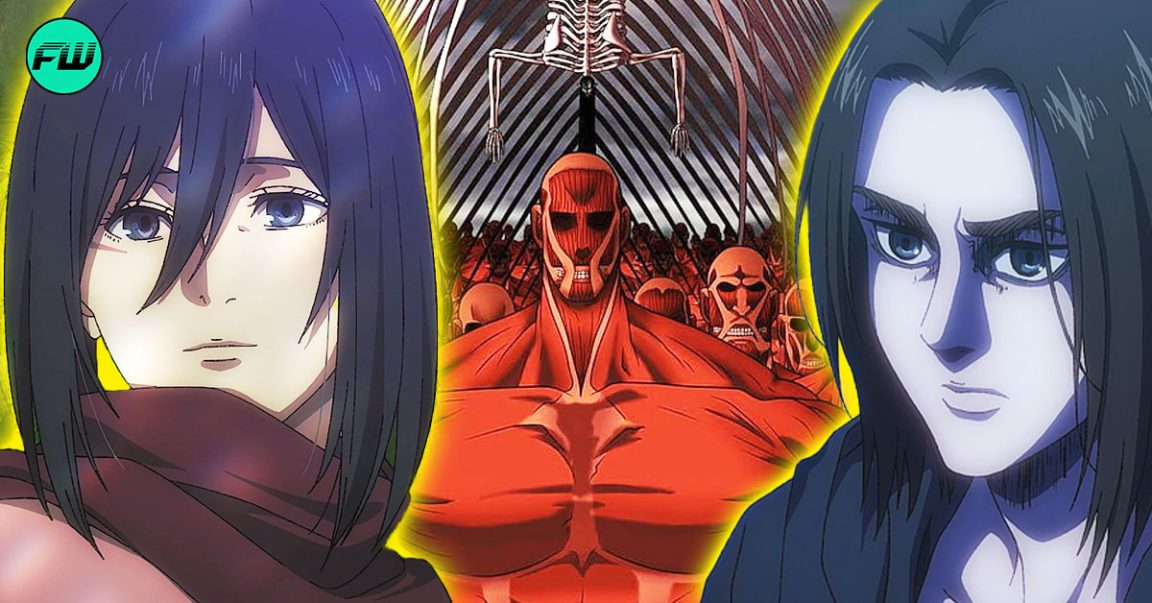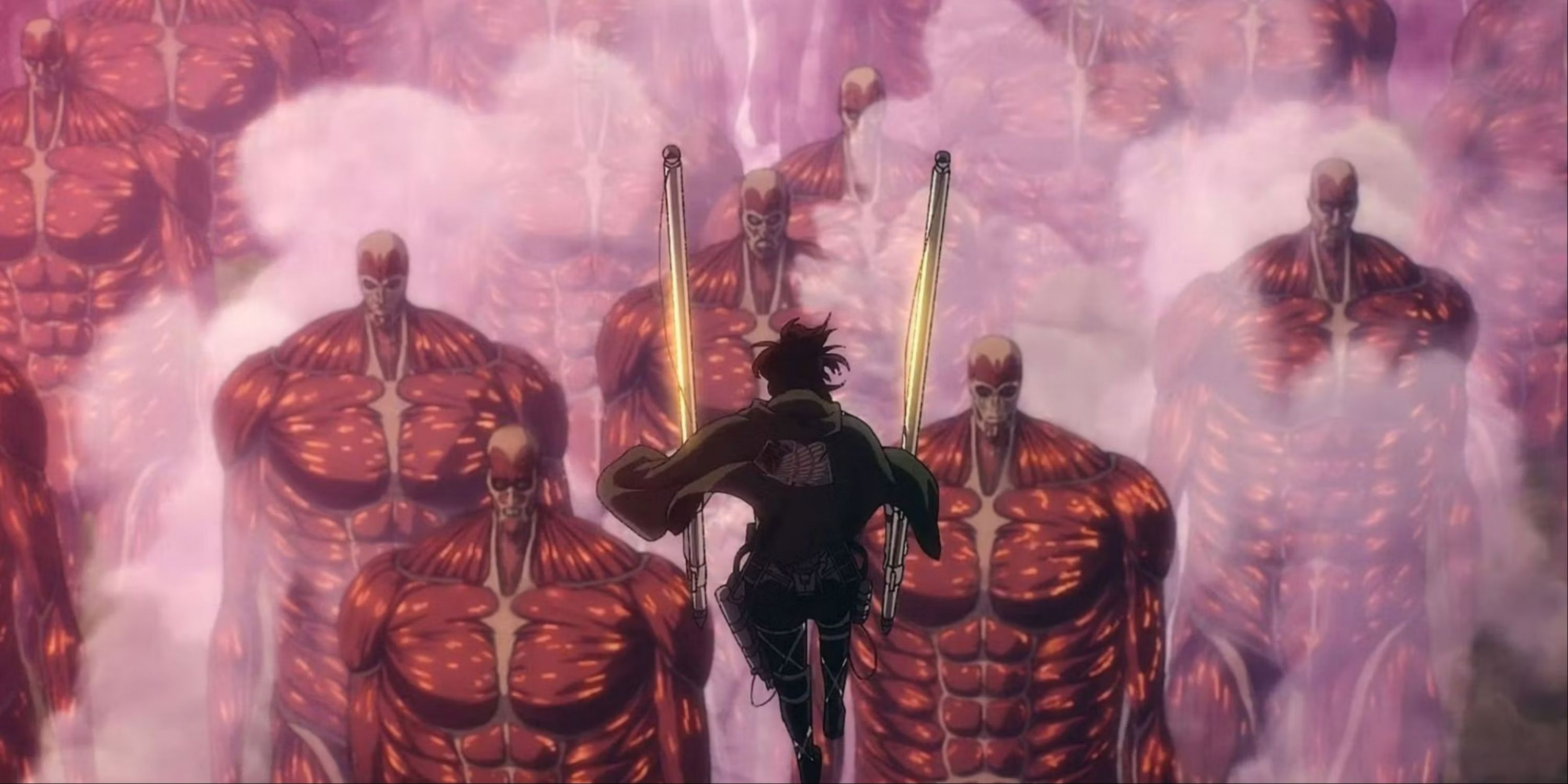Eren Yeager, the central figure in "Attack on Titan," evolves dramatically throughout the series, especially in his motivations for initiating the Rumbling. Initially portrayed as a passionate and determined hero, Eren's journey takes a dark turn as he grapples with the weight of his family's legacy, the oppression of his people, and the existential threats posed by the world beyond the Walls. Understanding his motivations is key to grasping the complexities of his character and the moral dilemmas he faces.
At the heart of Eren's motivations are several key factors:
- Desire for Freedom: Eren's primary motivation is his unyielding quest for freedom. Growing up within the confines of the Walls, he dreams of a world unrestricted by Titans and the fear they instill.
- Influence of Trauma: The tragic events of his childhood, including the loss of his mother, shape Eren’s worldview, pushing him towards extreme measures to protect those he loves.
- Awakening of Power: Eren’s transformation into a Titan shifter grants him immense power but also burdens him with the responsibility of using it for his people's survival.
- Desperation Against Oppression: Eren feels cornered by the relentless threat from Marley and the world, leading him to believe that the Rumbling is the only path to secure peace and freedom for Eldians.
The Concept of the Rumbling

The Rumbling is one of the most pivotal and chilling concepts in "Attack on Titan." It represents not just a physical event but also the culmination of Eren's complex motivations and ideologies. Essentially, the Rumbling involves unleashing the Titans within the Walls, specifically the Colossal Titans, to march across the world, obliterating any threats to Eldian survival.
This catastrophic event is rooted in the lore of the series, where the Rumbling was initially a defensive mechanism created by the Founding Titan. Here are some key aspects of the Rumbling:
- Scale and Destruction: The sheer scale of the Rumbling is unprecedented, with countless Titans capable of causing mass destruction. This not only signifies physical annihilation but also symbolizes Eren's drastic shift towards a more nihilistic worldview.
- Symbol of Freedom or Terror?: For Eren, the Rumbling is a means to achieve freedom for Eldians, but for others, it represents terror and genocide. This duality highlights the moral ambiguity of his actions.
- Moral Implications: The Rumbling raises profound ethical questions about the cost of freedom. Is mass destruction justified if it leads to the liberation of one's people? Eren's choice challenges the audience to reflect on the nature of sacrifice and morality.
- Finality and Consequences: The Rumbling serves as a final resort, showcasing Eren's desperation and determination. However, it also leads to dire consequences, affecting not just enemies but also friends and innocent lives caught in the chaos.
Through the concept of the Rumbling, "Attack on Titan" delves deep into themes of power, freedom, and the haunting effects of war, making it a cornerstone of Eren's tragic and gripping story.
Also Read This: What Channel Is WWE Royal Rumble on? TV and Streaming Info
3. Eren's Character Development Throughout the Series

Eren Yeager's journey in "Attack on Titan" is nothing short of transformative. Starting as an impulsive and hot-headed teenager, his character evolves significantly as he faces the harsh realities of his world. Initially, Eren's primary motivation is revenge against the Titans who destroyed his hometown and devoured his mother. This singular focus drives him to join the Survey Corps, where we see hints of his leadership qualities and fierce determination.
As the series progresses, Eren's experiences shape him into a more complex individual. The pivotal moment in his character arc occurs in Season 3, where he grapples with the moral implications of his actions and the weight of leadership. Here are some key stages of his development:
- Naïveté: Early on, Eren believes in the clear distinction between good and evil, viewing Titans solely as monsters.
- Awakening: Discovering the truth about Titans and his own powers forces Eren to confront uncomfortable truths about humanity, leading to a more nuanced understanding of his enemies.
- Isolation: As he learns more, Eren becomes increasingly isolated from his friends, showcasing his internal conflict and growing disillusionment.
- Decisiveness: By the end, Eren transforms into a figure willing to sacrifice everything for what he believes is freedom, culminating in his drastic decision to initiate the Rumbling.
This evolution makes Eren one of the most compelling characters in anime, illustrating that growth often comes at a significant cost.
Also Read This: Does Rumble Monetize Videos for Earning Money
4. The Role of Freedom and Isolation in Eren's Decision
Freedom is a central theme in "Attack on Titan," and it profoundly influences Eren's decisions, especially his choice to execute the Rumbling. Initially, Eren's notion of freedom is straightforward: he yearns to be free from the Titans threatening humanity’s existence. However, as the series unfolds, his understanding of freedom becomes more complex, intertwining with his feelings of isolation.
Eren’s isolation stems from his unique abilities and the burdens of knowledge he carries. As he learns the truth behind the Titans and the cycle of hatred, he feels increasingly alienated from his friends and comrades. This sense of isolation fuels his desire for freedom—not just for himself, but for the Eldians as a whole. Here’s how freedom and isolation play into his decision:
- Freedom as a Double-Edged Sword: Eren believes that absolute freedom can only be achieved through the eradication of threats, leading him to see the Rumbling as a necessary evil.
- Isolation from Allies: Eren’s growing distance from his friends, particularly Mikasa and Armin, highlights his internal struggle. He feels he can’t share his burdens, leaving him to pursue his drastic plan alone.
- Desperation for Change: Eren’s experiences lead him to believe that the world must change fundamentally, even if it means becoming a villain in the eyes of those he once loved.
Ultimately, Eren’s journey reflects the harsh truth that the quest for freedom often leads to profound isolation, and it’s this tragic realization that drives him to make the fateful choice of the Rumbling.
Also Read This: How to Get Todoroki in My Hero Ultra Rumble: Unlocking the Half-Hot, Half-Cold Hero
Impact of Eren's Actions on His Friends and Allies
Eren Yeager’s decision to initiate the Rumbling profoundly affected his friends and allies, reshaping their relationships and altering their motivations. The colossal march of Wall Titans represented the ultimate betrayal to some, while others viewed it as a tragic necessity. Let’s break down the impact:
- Betrayal and Heartache: Many of Eren's friends, especially Mikasa and Armin, struggled with feelings of betrayal. They had spent years fighting alongside him, only to find him on a path of destruction. Mikasa’s unwavering loyalty was tested as she grappled with her love for Eren versus her moral compass.
- Conflict of Ideals: Eren’s actions forced his allies, particularly Armin, to confront their beliefs about freedom and humanity. Armin wrestled with the idea that Eren’s vision of freedom came at the cost of countless lives, leading to a painful internal conflict.
- Radicalization of Allies: Characters like Reiner and Annie, who had once been viewed as antagonists, found common ground with Eren’s former friends. The Rumbling united unlikely allies against a common threat, illustrating how extreme circumstances can shift perspectives.
- Loss and Grief: The devastating consequences of the Rumbling deeply impacted all characters involved. Friends lost loved ones, which led to feelings of despair and a re-evaluation of their goals moving forward.
Ultimately, Eren’s drastic choices set off a chain reaction that redefined friendships and alliances, laying bare the complexities of loyalty in a world where survival often dictates ethics.
Also Read This: Why Rumble Is Becoming a Popular Video Platform Globally
The Themes of Sacrifice and Morality
The themes of sacrifice and morality are pivotal in understanding Eren Yeager’s motivations and the consequences of his actions in "Attack on Titan." Eren embodies the struggle between personal desires and the greater good, making his journey a compelling narrative of moral ambiguity.
| Theme | Description |
|---|---|
| Sacrifice for Freedom | Eren believes that to achieve true freedom, he must sacrifice everything, including his humanity and the lives of millions. This extreme perspective highlights how the quest for freedom can lead to devastating choices. |
| Moral Relativism | The series challenges the notion of absolute morality. Characters are often faced with morally gray decisions, forcing viewers to question what is right or wrong in a world filled with suffering. |
| Consequences of Choices | Eren’s choices lead to widespread devastation, raising the question of whether the end justifies the means. His actions serve as a commentary on the impact of individual choices on a larger scale. |
Through these themes, "Attack on Titan" invites us to reflect on our values and the sacrifices we make in pursuit of our beliefs. It ultimately asks: how far would you go for freedom, and at what cost?
Also Read This: Who Started the Rumble in The Outsiders?
7. Fan Reactions and Theories Surrounding Eren's Choice
The moment Eren Yeager initiated the Rumbling in Attack on Titan sparked intense discussions among fans. Many were left grappling with his drastic shift from a hopeful hero to a seemingly villainous figure. Let's dive into some of the major fan reactions and theories that emerged after this pivotal moment.
- Shock and Disappointment: A significant portion of the fandom was initially shocked by Eren's choice. Many fans who had rooted for him felt betrayed, believing he had abandoned his friends and ideals. Discussions on social media were rife with messages expressing disappointment, as fans grappled with his morally ambiguous actions.
- The "Necessary Evil" Theory: Some fans theorized that Eren's actions were a necessary evil. By unleashing the Rumbling, he aimed to eliminate the threat of humanity outside Paradis Island, ensuring the survival of his people. This perspective led to debates about whether ends justify means and sparked discussions on moral philosophy.
- Freedom vs. Oppression: Fans also explored Eren's actions as an extreme interpretation of freedom. In their view, he believed that true freedom meant annihilating any potential oppressors, raising questions about the cost of freedom and who gets to define it.
- Character Evolution: Many fans pointed out that Eren's journey reflects profound character development. They argued that his experiences throughout the series led him to this tragic decision, showcasing how trauma can drive individuals to extreme measures.
As fans delved deeper into the narrative, discussions only intensified, with theories evolving as the story progressed. Eren's choices became a focal point for broader themes of humanity, morality, and survival, making the fandom more engaged than ever.
8. Conclusion: The Legacy of Eren Yeager
Eren Yeager's legacy is one of complexity and contradiction. As a character that oscillated between heroism and villainy, his actions left an indelible mark on the Attack on Titan universe and its fans. Let's break down what Eren's legacy means for the series and its audience.
- Symbol of Sacrifice: Eren represents the extreme sacrifices that individuals make for their beliefs. His choice to initiate the Rumbling, though controversial, is often seen as the ultimate act of sacrifice for his people. This has evoked discussions on what it truly means to be a hero.
- Challenge to Morality: Eren's actions challenge viewers to confront uncomfortable questions about morality. Was he right to take such drastic measures for the sake of his people? This ambiguity keeps audiences engaged, inviting them to reflect on their values and beliefs.
- Catalyst for Change: Eren’s transformation serves as a catalyst for change not only within the narrative but also among the characters around him. His choices force them to confront their own beliefs and motivations, leading to significant character development.
- Enduring Discussions: Eren's legacy will likely endure in discussions among fans for years to come. His actions have inspired countless theories and debates, ensuring that Attack on Titan remains a topic of conversation long after its conclusion.
In essence, Eren Yeager's legacy is a multifaceted one, encapsulating the struggles of identity, freedom, and the heavy consequences of choice. His journey resonates deeply, making him one of the most compelling characters in anime history.
 admin
admin








